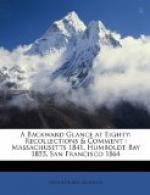The perilous journey was continued by the ascent of another mountainside. Provisions soon became very scarce, nothing but flour remaining, and little of that. On the 18th they went dinnerless to their cold blankets. Their animals had been without food for two days, but the next morning they found grass. A redwood forest was soon encountered, and new difficulties developed. The underbrush was dense and no trails were found. Fallen trees made progress very slow. Two miles a day was all they could accomplish. They painfully worked through the section of the marvelous redwood belt destined to astonish the world, reaching a small prairie, where they camped. The following day they devoted to hunting, luckily killing a number of deer. Here they remained several days, drying the venison in the meantime; but when, their strength recuperated, they resumed their journey, the meat was soon exhausted. Three days of fasting for man and beast followed. Two of the horses were left to their fate. Then another prairie yielded more venison and the meat of three bears. For three weeks they struggled on; life was sustained at times by bitter acorns alone.
At length the welcome sound of surf was heard, but three days passed before they reached the ocean. Three of the animals had died of starvation in the last stretch of the forest. The men had not eaten for two days, and devoted the first day on the beach to securing food. One shot a bald eagle; another found a raven devouring a cast-up fish, both of which he secured. All were stewed together, and a good night’s sleep followed the questionable meal.
The party struck the coast near the headland that in 1775 had been named Trinidad, but not being aware of this fact they named it, for their leader, Gregg’s Point.
After two days’ feasting on mussels and dried salmon obtained from the Indians, they kept on south. Soon after crossing a small stream, now named Little River, they came to one by no means so little. Dr. Gregg insisted on getting out his instruments and ascertaining the latitude, but the others had no scientific interest and were in a hurry to go on. They hired Indians to row them across in canoes, and all except the doctor bundled in. Finding himself about to be left, he grabbed up his instruments and waded out into the stream to reach the canoe, which had no intention of leaving him. He got in, wet and very angry, nursing his wrath till shore was reached; then he treated his companions to some vigorous language. They responded in kind, and the altercation became so violent that the row gave the stream its name, Mad River.




